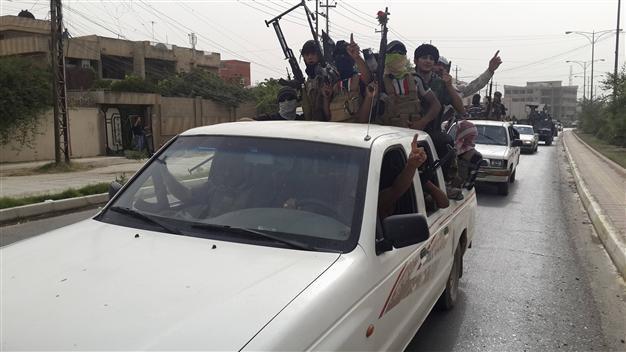ISIL militants 'executed 1,700 Shiite soldiers', UN alarmed
BAGHDAD / GENEVA

Fighters of the Islamic State of Iraq and the Levant (ISIL) celebrate on vehicles taken from Iraqi security forces, at a street in city of Mosul, June 12. REUTERS / Stringer
Concerns are growing over executions and mounting abuses by militants led by the Islamic State of Iraq and the Levant (ISIL), amid a warning from the United Nations that hundreds of people were killed, many of them summarily executed, after the seizure of Mosul.
“The full extent of civilian casualties is not yet known but reports received by UNAMI, the U.N. mission in Iraq, to this point suggest that the number of people killed in recent days may run into the hundreds and the number of wounded is said to be approaching 1,000,” Rupert Colville, the spokesman of the U.N.’s human rights chief Navi Pillay, told reporters in Geneva on June 13. UNAMI has its own network of contacts and had interviewed some of the 500,000 who fled Mosul, he said. A further 40,000 people were estimated to have fled from Tikrit and Samara, according to the International Organization for Migration.
Reports of retribution attacks and rapeThe statement came as reports suggest that the ISIL militants executed 1,700 Shiite soldiers who surrendered in Tikrit on June 12. “We’ve received reports of the summary execution of Iraqi army soldiers during the capture of Mosul and of 17 civilians in one particular street in Mosul city on June 11,” Colville said. The “great majority” of the militants were Iraqis, Colville said, citing UNAMI reports.
Prisoners released by the militants from Mosul prison had been looking to exact revenge on those responsible for their incarceration and some went to Tikrit and killed seven former prison officers there, Colville said.
Meanwhile, leading Shiite cleric Grand Ayatollah Ali al-Sistani has called on Iraqis to take up arms against militants marching on Baghdad. Thrusting further to the southeast after their seizure of Mosul and Tikrit, ISIL entered two towns in Diyala province bordering Iran on June 13. Saadiyah and Jalawla had fallen to the insurgents after government troops fled their positions, along with several villages around the Himreen Mountains that have long been a hideout for militants, security sources said.
“Citizens who are able to bear arms and fight terrorists, defending their country and their people and their holy places, should volunteer and join the security forces to achieve this holy purpose,” al-Sistani’s representative announced on his behalf during the main weekly prayers in the Shiite shrine city of Karbala. The elderly al-Sistani, who rarely appears in public, is the highest religious authority for the Shiites in Iraq.
Al-Sistani’s call to defend the country came as U.S. President Barack Obama said he was “exploring all options” to save Iraq’s security forces from collapse.
Obama said Iraq was going to need “more help from the United States and from the international community” to strengthen security forces that Washington spent billions of dollars in training and equipping before withdrawing its own troops in 2011. “Our national security team is looking at all the options ... I don’t rule out anything,” he said. One option under consideration is the use of drone strikes, like those controversially deployed in Afghanistan, Pakistan and Yemen, a U.S. official told Agence France-Presse.
Separately, U.S. Secretary of State John Kerry urged Iraq’s political factions to unite against the jihadists. “Make no mistake, this needs to be a real wake-up call for all of Iraq’s political leaders. Now is the time for Iraq’s leaders to come together and show unity,” Kerry said on a visit to London. Iraq was facing a “brutal enemy” that poses a threat to U.S. interests, as well as those of its allies in Europe and the Middle East, Kerry said. He added that given the gravity of the situation, he would anticipate “timely decisions” from President Obama in tackling the challenge. “We are laser-focused on dealing with the crisis ahead,” he said.
The Iraqi Interior Ministry said it had adopted a new security plan for Baghdad to protect it from the advancing jihadists. “The plan consists of intensifying the deployment of forces, and increasing intelligence efforts and the use of technology such as [observation] balloons and cameras and other equipment,” ministry spokesman Brigadier General Saad Maan said. “We have been in a war with terrorism for a while, and today the situation is exceptional.”
